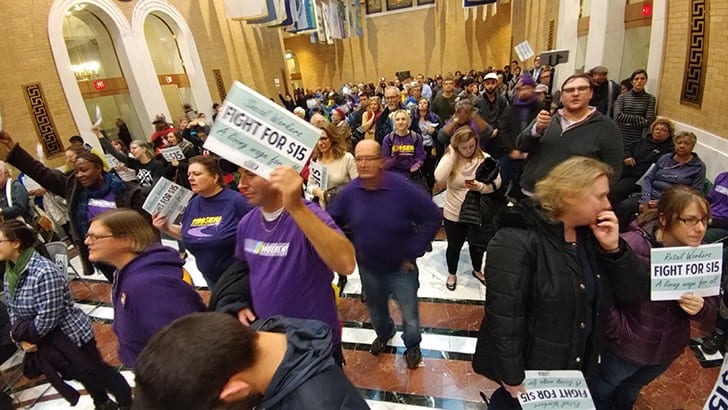
August 16, 2018
BY JASON PRAMAS @JASONPRAMAS
Transportation is a subject I address frequently in my columns. But, as is often the case in journalism, it’s usually necessary to write about it piecemeal given various editorial constraints. So I might cover flooding subways one week and a gonzo proposal for sky gondolas over the Seaport the next. But rarely do I have the luxury of looking at such a major policy area in its entirety. Which is nonideal because a good journalist is always interested to spark discussion and debate—and it’s difficult to have a proper conversation with readers if they aren’t aware of my general views on the topic at hand.
Such was the case a three weeks ago when I published a piece that took a dim view of Bird Rides dumping its dangerous electric rental scooters all over Cambridge and Somerville without first discussing the move with officials in either city… following a nationwide pattern of flouting relevant laws that is clearly its business model. About a day later, a few wags took to Twitter to slam me for having the temerity to suggest that motorized skateboards with handlebars might not be the ideal vehicles to allow on area streets in numbers. On both political and safety grounds.
I didn’t mind the hazing, of course. But it was vexing to watch Bird fans that clearly hadn’t even bothered to read the article in question—let alone my broad and deep back catalog—attack me as some kind of car-loving anti-environmental reactionary in the service of flogging their hipster transportation fetish du jour. Be they paid marketers or merely geeks with an idée fixe.
With that in mind, I thought it would be useful to run through my general views on transportation policy in this epistle. To clarify why I don’t think that any electric conveyance thrown at us by sociopathic West Coast frat boy CEOs is automatically the best way to save the planet while safely getting people around town with their groceries and pets. I will, however, leave long-distance intercity travel by land, sea, and air aside for now for the sake of space.
Carbon
It’s not possible to hold forth on transportation without first addressing the absolute necessity that humanity stop burning carbon to meet our civilization’s power needs. If we fail to shift from getting power from oil, gas, and coal to clean renewable energy sources like wind, water, and solar, then we are well and truly doomed. Not in centuries, but mere decades from now. Among the largest sources for global warming inducing carbon emissions are cars, trucks, and motorcycles. And with carbon multinationals like ExxonMobil dominating American politics, it’s going to be extremely difficult to institute the major changes that will be required to replace those vehicles—and the “car culture” that has built up around them—with zero carbon alternatives that will be acceptable to a broad array of communities. Yet without such a transition, anything else we might do will merely be tacking colorful bunting onto our species’ collective coffin. That said, any decent transportation network will have to be based on electricity. Unless some of our cleverer scientists and engineers come up with sufficiently powerful and portable renewable power sources (tiny cold fusion reactors, harnessing evil spinning gnomes, etc.) that don’t require plugging vehicles into charging stations for periods of time every day or three.
Planning
We’re not going to be able to move millions of people to new green transportation alternatives without redesigning the places where they live and work. One appealing way of doing that over time is to build dense clusters of housing and offices around major multimodal transportation hubs that are connected to each other by mass transit. Which will, among other salutary effects, help solve the “last mile” problem of getting commuters from such hubs to their homes and workplaces in weather conditions that are only going to get more unpredictable and dangerous as climate change accelerates.
But while it’s become fashionable and profitable for developers to build such high-density enclaves for rich people, it is generally not being undertaken for everyone else. Until it is, it’s going to be extremely difficult to successfully introduce the transportation alternatives we need. Probably the toughest issue will be converting existing urban neighborhoods and suburban tracts based on square miles of individual atomized domiciles over to sort of more compact and connected urblets without upending people’s carefully constructed lifeways by government fiat. Though, ironically, the global warming-driven imperative of our moving entire cities like Boston away from flooding lowlands onto higher ground—and eventually northward to cooler climes—will provide us an opportunity to start development from scratch in many locales. Since given the choice between staying in aging housing stock with ever worsening service and transportation options, and moving to new clusters of high-rise and low-rise buildings hooked up to a robust grid, people will likely move of their own accord.
Alternatives
And what are the cheaper, ubiquitous, and more efficient transportation modalities that will get us to a carbon-free future? I think trains, trolleys, monorails, and similar mass transit options will still play a vital role in moving large numbers of people from neighborhood to neighborhood and city to city. In fact, I believe we need to massively expand rail lines to reach far out into the exurbs. And figure out ways to use such lines for cargo containers as well. Buses—with dedicated lanes—will remain vital in many areas. Especially where it’s too expensive or impractical to build out rail lines. Boats can also be very useful for the same purpose in most weather conditions in areas adjacent to oceans, lakes, and rivers.
And cars? Well, that’s a big complicated discussion, but here’s my brief take. Carbon-burning cars need to be relegated to museums and antiquarian societies for collectors and hobbyists. But there’s no getting around fact that despite all their myriad problems, most people currently like being able to jump into a car and go where they want to go. So what can replace that? At first, shifting over to electric cars will be a big help. Then there will be a debate over robot cars. And that’s a tricky one because that technology won’t work well at first, and will displace many driving jobs if not introduced deliberately without corporate malice aforethought. Don’t be surprised, therefore, if you see me attacking “public-private” initiatives to shove such cars down people’s throats.
Nevertheless, society will gain much if we can make the new technology work. Because fleets of robot cars can likely replace the individually owned car entirely. Allowing people to get between areas well away from major transportation hubs at will—simply by using the future equivalent of a rideshare app to order a robot car for the trip. Robot trucks will be able to deal with moving cargo point to point. And simple electric golf carts—either robotic or not—will suffice for trips around neighborhoods.
We can then gradually reduce or eliminate motor vehicle traffic from many roads over time—allowing bicycles (on ubiquitous dedicated bike lanes) to really come into their own. As for electric scooters? In most locales it will probably be best if they remain an idiosyncratic vehicle choice for young individuals who like to stand out from the crowd, and not accepted as a serious transportation alternative. Because they’re not. Meanwhile, flying cars, jetpacks, and the like will have to be a topic for a future article.
Labor
Building out transportation alternatives needs to be seen as an opportunity for new job creation, not just an excuse for job destruction for the purpose of corporate profit extraction. Such jobs should be “good jobs” with living wages, shorter work weeks (something we’ll need worldwide to compensate for the rise of the robots), and generous benefits. People losing jobs in the existing transportation sector should be retrained at government expense and get priority placement in jobs in the new transportation sector. All of said jobs should be unionized.
Public
As many of these transportation alternatives as possible should be public. Leaving our transit future to private companies like Uber, Lyft, Lime, Bird Rides, etc. is a prescription for disaster. Because all such corporations look out for their bottom lines first, and the public good second (if at all). And every entrant to that new sector has sought to end-run public planning processes and government regulators in a never-ending quest to make a fast buck—to the point of Uber purposely designing their payment algorithm so that their drivers would keep driving while making as little money as possible, according to Vanity Fair.
So if we’re going to ensure that commuters have a voice in a reasonably democratic and rational transportation planning process going forward, then we have to expand public transportation to control the commanding heights of its sector. And regardless, the role of privately owned vehicles must be minimized if we’re going to reduce carbon emissions enough to save ourselves from the worst depredations of human-induced global warming.
That’s my basic thinking on at least regional transportation. Happy to participate in civic dialogues on the subject any time.
Thanks to Suren Moodliar, co-author of the forthcoming A People’s Guide to Greater Boston [University of California Press], for ongoing ever-illuminating conversations on transportation, housing, and many other policy areas.
Apparent Horizon—winner of the Association of Alternative Newsmedia’s 2018 Best Political Column award—is syndicated by the Boston Institute for Nonprofit Journalism. Jason Pramas is BINJ’s network director, and executive editor and associate publisher of DigBoston. Copyright 2018 Jason Pramas. Licensed for use by the Boston Institute for Nonprofit Journalism and media outlets in its network.
![Greenfield City Hall by ToddC4176 at en.wikipedia [CC BY-SA 3.0] from Wikimedia Commons](https://digboston.com/wp-content/uploads/2018/08/Greenfield-City-Hall-by-ToddC4176-at-en.wikipedia-CC-BY-SA-3.0-from-Wikimedia-Commons-728x410px.jpg)






